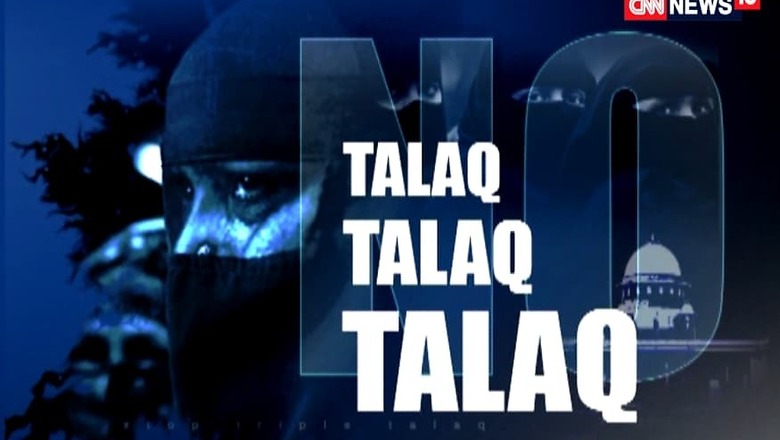
views
In August 2017, the Supreme Court in a landmark judgment held triple talaq as a practice not “essential” to Islam which is violative of the right to equality and did not merit any protection under the right to freedom of religion. Therefore, the unconstitutionality of triple talaq was a settled point of law. It was the mandate of a legislature to etch out finer details and ensure a framework for empowerment and protection of married Muslim women.
Pursuant to this, the Muslim Women (Protection of Rights on Marriage) Bill 2017 commonly known as Triple Talaq Bill was introduced and passed in the Lok Sabha on Thursday.
The bill was passed without any amendments, but the day’s proceedings saw a series of speeches which had a mix of political rhetoric, emotional pleas and substantial inputs. Filtering out the noise and unnecessary polarisation that has accompanied this issue, let’s look at the merits of this Triple Talaq Bill to evaluate if it has done justice to the mandate thrust upon it by the Supreme Court.
It is a historic move to criminalise the pronouncement of triple talaq either in writing or through spoken words as it punishes criminal abandonment. However, this bill comes with its legal and procedural anomalies. Unlike other divorce laws in India, the focus here is on deterrence of the practice of triple talaq through criminalisation rather than the reconciliation of marriage in which the toothless threat of triple talaq has been made. These two are not necessarily mutually exclusive.
In fact, the Bangladesh Law explicitly referred to by Law Minister Ravi Shankar Prasad provides for a statutory obligation to carry out counselling or conciliation efforts in cases where a notice of divorce has been duly given. An overview of the 22 Muslim countries that have abolished triple talaq shows that the focus is on two aspects — reconciliation of marriage and pronouncement of divorce by a court of law. Both these aspects do not make it to the bill. There are three prominent reasons for India should consider such an approach.
Firstly, in criminal law jurisprudence, to prove a crime, it is essential to prove that the accused committed the act and had means or intention. The bill stipulates that once the talaq is are uttered, it amounts to a cognizable and non-bailable offence. It may be beneficial to first ensure that the husband uttering such words is counselled and a conciliation effort is made for the marriage.
In the absence of a cooling-off period or mandatory conciliation, it would be a highly probable defence for the accused man to claim that the words were uttered hastily as emotional outpour and prove that he intends to work on the marriage. With ambiguity looming over onus of burden of proof, we must acknowledge that an oppressed married woman may not be open to reporting such an incident if it only leads to temporary imprisonment.
Secondly, the status of the marriage during the pendency of such proceedings against the husband remains unclear. It is interesting to note that the bill remains silent on whether such criminal proceedings automatically imply that the marriage is over. If this is the case, then this bill inadvertently legitimises the pronouncement of divorce through triple talaq.
If this is not the case, the bill is inept in dealing with the manner in which a divorce would be obtained. A similar procedural irregularity exists in Hindu law in as much as the criminal offence of cruelty by Husband under IPC does not suo moto lead initiation of divorce proceedings. Over the years the judiciary has come down on the provision of in question and highlighted the potential of its abuse.
In fact, this year itself the Supreme Court has issued guidelines to water down arrests under this provision. Perhaps, we should take a cue from our previous lessons and ensure that our future laws don’t carry the same follies. This was articulately highlighted during the debate in the Lok Sabha by Member of Parliament, Supriya Sule.
Lastly, the bill lacks any provisions making it mandatory for police officers to take cognisance of such offences when reported. The attitude of the police, especially regarding crimes against women, of not filing FIRs and treating such reports as “minor” incidents is common knowledge.
In fact, to curb such situations, the legislature after the Nirbaya case had expressly added provisions for making it mandatory for police officers to file FIRs and conduct a proper inquiry in certain cases of violence against women. It would have been worth considering such provisions in this bill as well.
There were repeated demands in the Lok Sabha for referring this bill for deliberations to a Standing Committee in a time bound manner as there was just a week’s time between the circulation of the bill and consideration of the same. The government was of the view that appropriate amendments should have been moved to address the respective concerns. However, the amendments moved were voted out with one amendment only receiving one vote.
The bill is likely to be introduced in the Rajya Sabha. There is potential for such amendments to be moved in the Rajya Sabha or reference to the Standing Committee for deliberation and consultation. Hopefully, the Government will decide to take their efforts of protecting married Muslim women a step further and consider some changes as well.
(The author is a lawyer and a public policy professional. Views expressed here are personal)



















Comments
0 comment